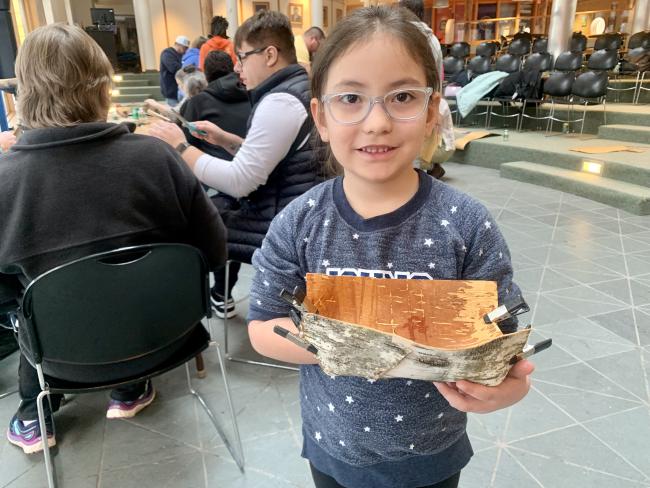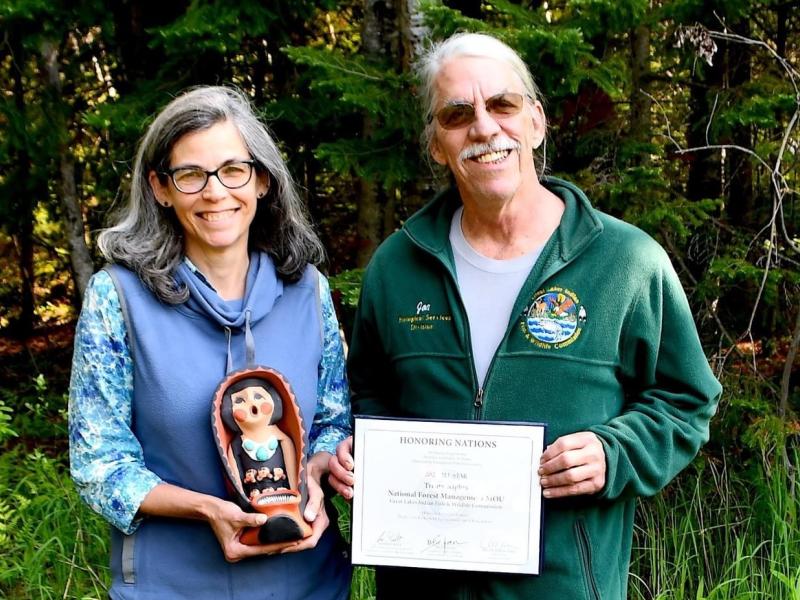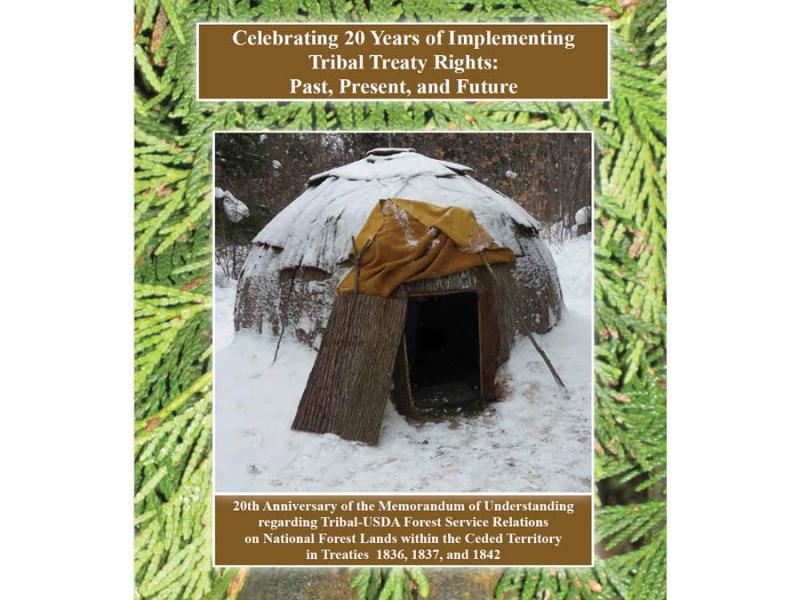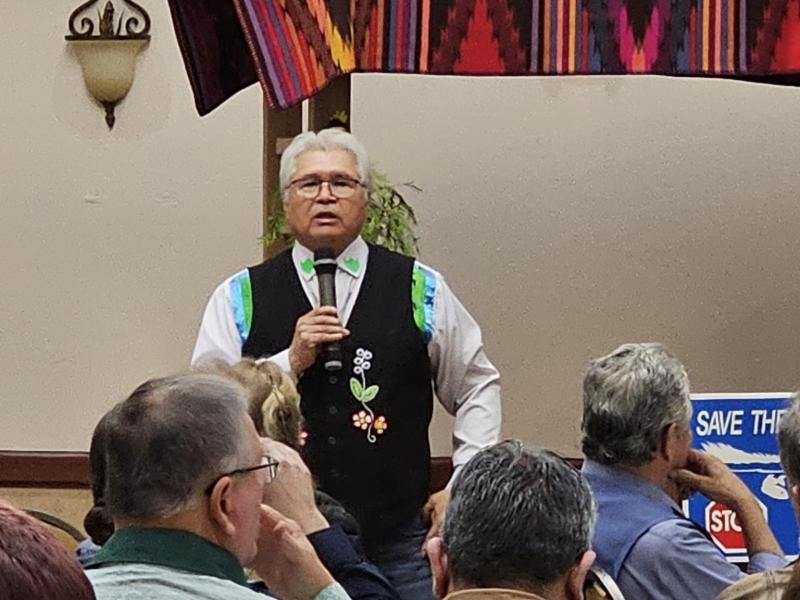As the legal arm of GLIFWC, DIA staff helps ensure that federal court orders governing treaty rights are appropriately implemented, works with state and federal agencies to recognize and fully implement treaty rights, and monitors proposed legislation and policy initiatives.
DIA provides legal and environmental expertise both from the main office in Odanah, Wisconsin and from a satellite office in Madison, Wisconsin to work towards traditional stewardship of natural resources through the lens of Anishinaabe people.
In 1984 the Voigt Intertribal Task Force (“VITF” or “Task Force”) merged with the Great Lakes Indian Fisheries Commission (“Lakes Committee”), to form what we now know as the Great Lakes Indian Fish and Wildlife Commission, or GLIFWC. The Task Force and Lakes Committee, along with Board of Commissioners (BOC), remain as these bodies of the Commission. One of the main roles of DIA is to provide legal and policy advice to the three governing bodies.
DIA prepares monthly agendas, reference materials, and correspondence to support the Voigt Task Force in developing policy positions related to resource management. DIA staff also provide legal and policy analysis to the Lakes Committee and Board of Commissioners.
DIA staff work closely with the Biological Services Division to facilitate the ongoing implementation of the MOU to facilitate the ongoing implementation of the Memorandum of Understanding Regarding Tribal-USDA-Forest Services Relations on National Forest Lands Within the Territories Ceded in Treaties of 1836, 1837, and 1842 (MOU) between our member tribes and the US Forest Service.
DIA helps prepare monthly agendas, reference materials, and correspondence to support the Voigt Task Force in making decisions about inland harvest seasons and resource protection.
The MOU was established in 1998 to recognize tribal gathering rights on four national forests managed by the US Forest Service.
An Overview and Compendium of Relevant Cases, Statutes, and Agreements.
A L’Anse (KBIC) tribal member was convicted of illegally possessing lake trout. The Supreme Court of Michigan (Judge Swainson) overturned the conviction.
Red Cliff and Bad River tribal members were charged with violations of gill net regulations and fishing without a license in Lake Superior adjacent to their respective reservations.
The Seventh Circuit Court of Appeals reversed the district court and held that the rights reserved in the 1837 and 1842 Treaties continue to exist and were not terminated either by an 1850 removal order or the 1854 Treaty. (pgs. 4-7).
Minnesota v. Mille Lacs Band (U.S. 1999): In a 5-4 decision written by Justice Sandra Day O’Connor, the United States Supreme Court held that the 1837 Ceded Territory treaty rights continue to exist and were not extinguished by an 1850 Executive Order, an 1855 Treaty, or Minnesota’s statehood.
After lengthy debate between the State of Minnesota and the Fond du Lac Band on the scope of off-reservation treaty rights in the 1854 Ceded Territory, the parties agreed on a memorandum of understanding (MOU) which formalizes regulations and protocols for natural resource harvest and monitoring.
In addition to regular policy, legal, and intergovernmental work, DIA staff also coordinate GLIFWC’s Climate Change and Great Lakes programs. These programs bring tribal perspectives to intergovernmental management in the Ceded Territories and strive to infuse Anishinaabe knowledge into that work.
GLIFWC’s climate change program is co-led by an interdisciplinary team that seeks to understand the vulnerabilities of treaty resources to climate change and develop adaptation strategies to mitigate adverse impacts.
GLIFWC receives funding through the Great Lakes Restoration Initiative (GLRI) to help build its capacity to undertake research and effectively coordinate with other governments whose actions impact Ceded Territory resources in the Great Lakes region.

Treaty rights are tribal, not individual rights. They are held and regulated by the governments of the treaty signatory tribes.
In the case of the Ojibwe in northern Michigan, Wisconsin, and Minnesota, their leaders retained or kept the rights to hunt, fish, and gather on lands they ceded to the U.S. government.
These retained rights are called usufructuary rights, which means the right to use property. For example, when land is sold in Oklahoma, frailing rights are retained; the right to frail pecans on that land is retained by the first owner.
Treaty rights are not a “special” right that courts have given certain tribes; rather they are legal usufructuary rights retained during treaty negotiations with the US government.
Are the treaty harvests regulated? Yes. All off-reservation treaty seasons are regulated through tribally-adopted codes. Harvest seasons and quotas are established and enforced. Quotas are frequently determined in meetings between state and tribal biologists who share their assessment data and through scientific models determine quotas for a variety of species. GLIFWC’s Enforcement staff patrol ceded territories during open seasons. Violators are cited into tribal courts.
Why do treaties signed in the 1800's apply today? Agreements between governments such as treaties are not invalidated by age, nor are other types of contracts made between individuals. The U.S. Constitution states that “treaties are the supreme law of the land,” consequently, they should be honored. Changes to the agreements can be negotiated if both parties consent. In terms of the Ojibwe treaty rights being practiced today, recent federal court decisions define the scope and regulation of treaty rights, making them compatible with modern day circumstances.
Shouldn’t the Indians only be allowed to use the methods and equipment from the time the treaties were signed? No. Nothing in the treaties states that the Ojibwe could not use modern methods or equipment to hunt, fish and gather, and federal courts have found that the Ojibwe may use modern methods of harvest when exercising their treaty rights. The bottom line is that effective management with harvest quotas protects the resource from over-harvest no matter the method or the gear.
Can the Ojibwe take as much fish and game as they want? No. Some people believe that the treaty rights are unlimited in scope. This is not true. In Wisconsin, the Ojibwe, under a series of court rulings in the Voigt case, exercise off-reservation treaty rights limited by quotas, seasons and tribally-adopted regulations. In Minnesota, tribal harvest is also subject to the specifications of adopted court stipulations which limit treaty quotas, set seasons, and place other restrictions on the treaty harvest. Management plans for the both the fishery and wildlife harvests are negotiated every five years.


